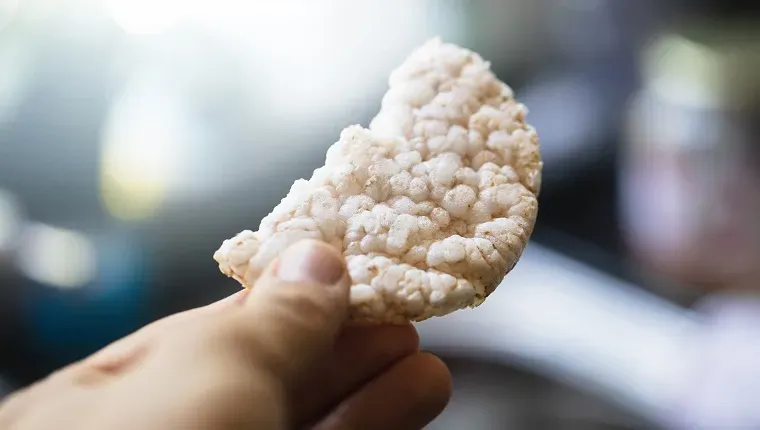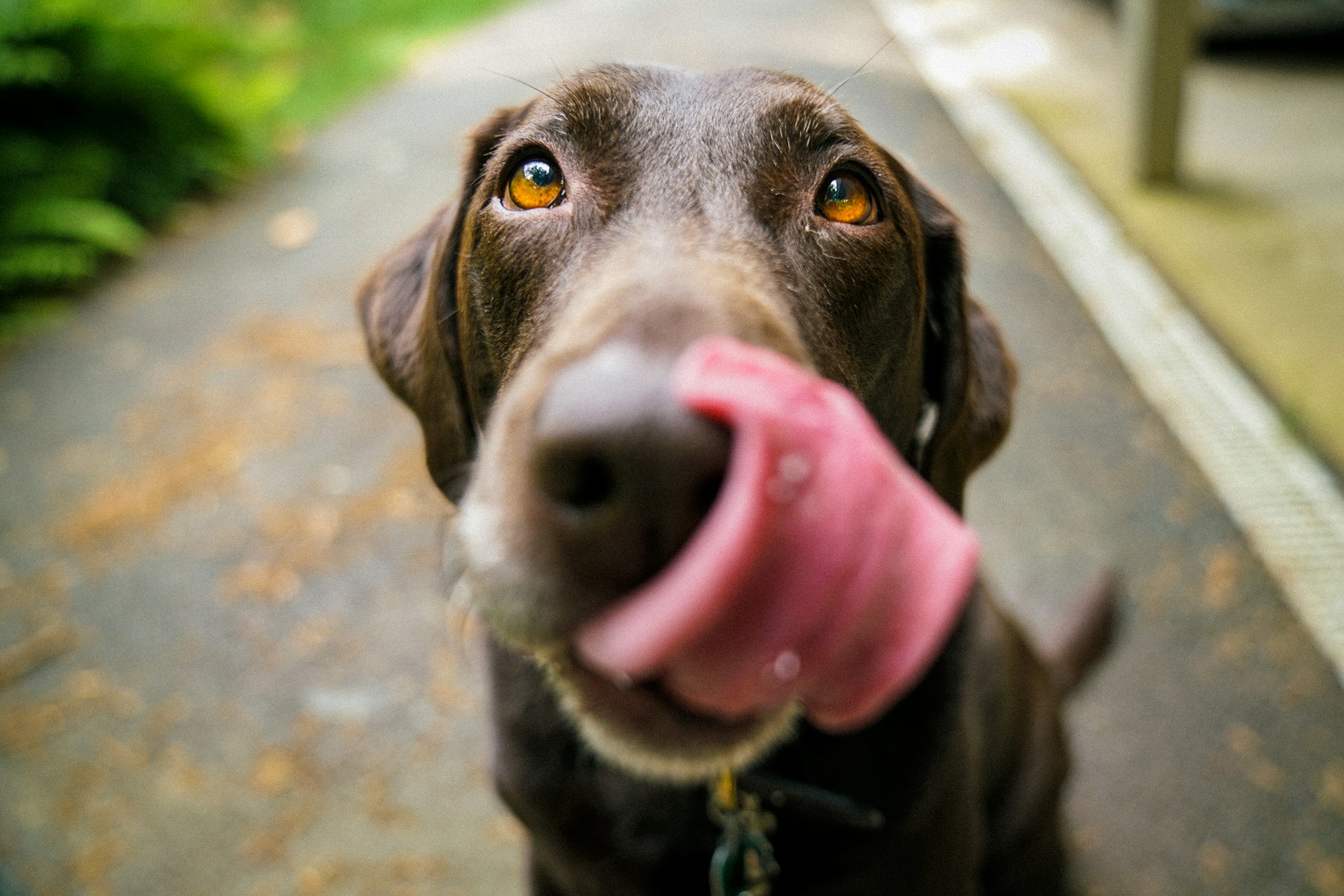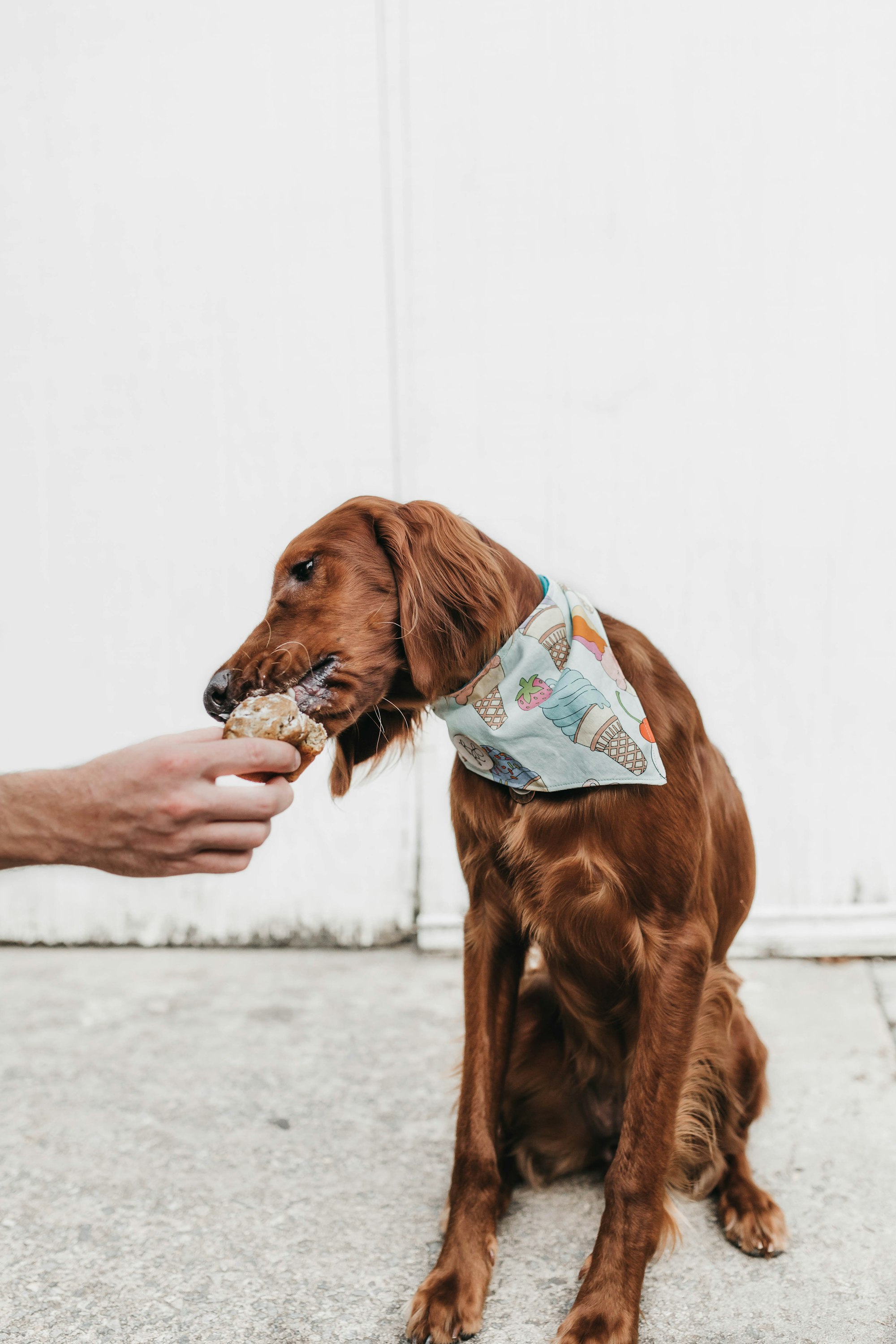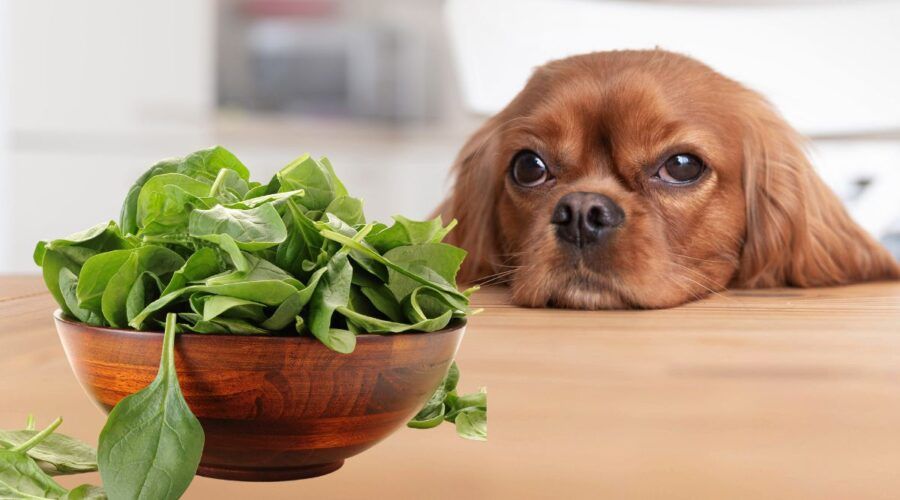Rice cakes are a popular snack for humans, but when it comes to our furry friends, we often wonder if it's safe for them to enjoy this treat. Can dogs eat rice cakes? Let's explore the topic further to understand the potential benefits and risks for our canine companions.
Are Rice Cakes Safe for Dogs? It is generally safe for dogs to consume plain rice cakes in moderation. There are certain factors to consider, such as the ingredients used in the rice cakes and the individual dog's dietary needs and sensitivities.
Are Rice Cakes Nutritious for Dogs? Rice cakes can serve as a low-calorie and low-fat treat for dogs, often being a gluten-free choice suitable for canines with particular dietary restrictions or sensitivities. Besides offering carbohydrates and fiber, they can complement the benefits of dog probiotics in supporting a balanced diet.
Potential Benefits of Dogs Eating Rice Cakes: Rice cakes can offer a crunchy texture that dogs may enjoy, and they can serve as a healthier alternative to high-calorie treats. They can also be used as a training aid or a distraction tool for dogs.
Potential Risks of Dogs Eating Rice Cakes: Though rice cakes might be safe for dogs in limited amounts, they come with potential hazards. Digestive issues, heightened sodium content, and potential allergic reactions are concerns when giving rice cakes to dogs. It's crucial to be cautious, especially when considering other supplements like melatonin for dogs, to ensure their overall well-being.

Alternatives to Rice Cakes for Dogs: If you're looking for safe and healthy treat options for your canine companion, there are several alternatives to consider. Opt for dog-friendly fruits and vegetables or explore commercially available dog treats that are specifically formulated for dogs' nutritional needs. Home-cooked rice options, such as plain cooked rice without any added seasoning, can also be a suitable alternative for dogs who enjoy rice-based snacks.
By considering the potential benefits and risks of feeding rice cakes to dogs and exploring alternative options, you can make informed decisions about including this snack in your dog's diet. It's always recommended to consult with your veterinarian before introducing any new food items to your dog's routine to ensure their overall health and well-being.
Key takeaway:
- Rice cakes can be safe for dogs to eat: While rice cakes are generally safe for dogs, it is important to consider their individual dietary needs and any potential allergies or sensitivities they may have.
- Rice cakes may not be nutritious for dogs: Rice cakes do not offer significant nutritional value for dogs and should not replace a balanced and appropriate diet.
- Consider potential risks before feeding rice cakes to dogs: Digestive issues, high sodium content, and allergic reactions are potential risks associated with dogs eating rice cakes. It is advisable to consult a veterinarian before introducing rice cakes into a dog's diet.
- Explore alternative treat options for dogs: There are various safe and healthy treat options available for dogs that can serve as alternatives to rice cakes. Home-cooked rice options can be a healthier choice for dogs.
Are Rice Cakes Safe for Dogs?
Rice cakes are generally safe for dogs due to their soft and easily chewable texture. Choose the right size of rice cakes suitable for your dog's breed and size.
Plain, unsalted rice cakes are generally safe for dogs. Be careful with flavored varieties that may contain harmful ingredients like onion or garlic powder. Always check the ingredients list.
If your dog has a known sensitivity or allergy to rice, it's best to avoid feeding them rice cakes.
Give rice cakes in moderation to avoid weight gain and digestive issues in dogs.
Consult with your veterinarian before introducing rice cakes to your dog's diet, especially if they have any pre-existing health conditions or dietary restrictions.
Consider your dog's specific needs, consult with your vet, and ensure the ingredients are safe before offering rice cakes as an occasional treat.
Are Rice Cakes Nutritious for Dogs?
Rice cakes are made primarily of rice, which is a carbohydrate. Dogs require a diet rich in protein for their overall health and well-being. Rice cakes alone may not provide all the necessary nutrients for dogs. They may lack important vitamins and minerals that dogs need for their growth, muscle development, and overall immunity. While rice cakes may be low in fat and calories, they do not provide significant amounts of these essential nutrients.
Feeding dogs rice cakes in moderation is unlikely to be harmful. Incorporating them as a regular part of a dog's diet may not meet their nutritional needs. It is best to offer rice cakes as an occasional treat instead of a staple food.
Potential Benefits of Dogs Eating Rice Cakes
Dogs eating rice cakes can experience a variety of potential benefits. These include:
- Versatility as a snack: Rice cakes can serve multiple purposes such as training treats, rewards, or a low-calorie option for dogs on a diet.
- Promotion of digestive health: Rice cakes have a low fat content and are easily digestible, making them suitable for dogs with sensitive stomachs or digestive issues.
- Support for weight management: Incorporating rice cakes into a weight management plan for overweight dogs can be beneficial due to their low calorie content.
- Supply of carbohydrates: Rice cakes are primarily composed of rice, which provides dogs with essential carbohydrates for energy and overall bodily functions.
- Reduced allergenic potential: Rice cakes are hypoallergenic and are less likely to cause allergies or food sensitivities compared to other snacks or treats.
- Additional nutrients: Certain rice cakes are enriched with vitamins and minerals, enhancing the overall nutrition of dogs.
- Promotion of dental health: The crunchy texture of rice cakes helps to minimize the buildup of plaque and tartar on dogs' teeth, contributing to better dental health. It's important to note that rice cakes should not replace regular dental care such as brushing or professional cleanings.
It is essential to moderate the amount of rice cakes given to dogs and consider their individual dietary needs and specific health conditions. Before introducing rice cakes or any other treats into a dog's diet, it is advisable to consult with a veterinarian.
Potential Risks of Dogs Eating Rice Cakes
In the realm of dogs and rice cakes, several potential risks warrant every pet owner's attention. In this segment, we'll delve into the specifics of these risks and their implications for your beloved canine companion.
We'll navigate through concerns ranging from potential digestive issues to the elevated sodium content. Additionally, while unrelated to rice cakes, issues like Hip Dysplasia and separation anxiety also play significant roles in your dog's well-being, emphasizing the importance of holistic care and attention.
We'll touch upon the potential for allergic reactions, shedding light on the importance of being cautious when introducing new treats into your pet's diet.

Possible Digestive Issues
Eating rice cakes can potentially cause digestive issues in dogs. The dry and compact nature of rice cakes can lead to constipation or difficulty in bowel movements, especially if dogs consume a large quantity without drinking enough water.
- Rice cakes are high in fiber, which can be beneficial in small amounts for dogs with certain digestive issues. Excessive fiber intake can cause bloating, gas, and diarrhea in some dogs.
- Dogs with sensitive stomachs or food allergies may experience gastrointestinal upset after eating rice cakes. The ingredients in rice cakes, such as rice flour and additives, could trigger digestive discomfort or allergic reactions in susceptible dogs.
- It is also important to note that another potential digestive issue related to rice cakes is the risk of choking or gastrointestinal obstruction. Rice cakes can expand and become sticky when in contact with fluids, increasing the risk of blockages in the digestive tract if a dog consumes a large piece or swallows it without chewing enough.
Pro-tip: If you want to introduce rice into your dog's diet, it is advisable to cook plain rice and mix it with their regular food. This will provide them with the benefits of rice without the potential digestive issues associated with rice cakes. Always consult with your veterinarian before introducing any new food to your dog's diet to ensure it is safe and appropriate for their specific needs.
High Sodium Content
Rice cakes have a high sodium content that can pose risks for dogs.
- High blood pressure: Rice cakes contain a lot of sodium, which can raise a dog's blood pressure and cause heart problems.
- Dehydration: Excessive sodium can lead to dehydration in dogs by making them thirstier and increasing urine output. It must be balanced with water intake.
- Kidney damage: Dogs with pre-existing kidney conditions or older dogs may be more vulnerable to the negative effects of high sodium content. Excess sodium strains the kidneys and can cause long-term kidney damage.
While dogs need some sodium, it is important to monitor their intake and provide a balanced diet. Consulting a veterinarian can help determine the appropriate amount of sodium for a dog's specific needs.
If you want lower sodium alternatives to rice cakes, there are many safe and healthy treat options available for dogs. These treats are specifically designed to meet their dietary needs without compromising their health. Homemade rice options can also be a suitable alternative as they allow for better control over the ingredients used, resulting in a healthier and lower sodium option for dogs.
Allergic Reactions
Dogs can have allergic reactions, just like humans can develop allergies to certain foods. Allergic reactions in dogs may include itching, hives, swelling, vomiting, or diarrhea. The severity of these symptoms varies depending on the dog and the level of allergic response.
While allergies can still occur, rice is generally safe for dogs and is even found in some commercial dog foods. If your dog shows signs of an allergic reaction after eating rice cakes, it's best to stop feeding them and consult with a veterinarian.
A Labrador Retriever named Max experienced an allergic reaction to rice. His owner, Sarah, gave him a rice cake as a treat, but Max began scratching intensely and developed red, swollen patches on his skin. Sarah took Max to the vet, who confirmed the rice allergy. With proper treatment and a different type of treat, Max's symptoms went away, and he could enjoy treats without any issues.
This story reminds us that every dog is unique and may have individual sensitivities or allergies. It's important to be observant and cautious when adding new foods to a dog's diet to ensure their well-being and prevent allergic reactions.
Alternatives to Rice Cakes for Dogs
Looking beyond the realm of rice cakes, let's explore some delectable alternatives that are safe and healthy for our furry friends. From a variety of treat options that will make their tails wag with delight to home-cooked rice dishes tailored specifically for dogs, we have a range of mouthwatering possibilities to explore. So, without further ado, let's dig into the world of canine culinary delights that go beyond rice cakes!
Safe and Healthy Treat Options
When selecting safe and healthy treats for your dog, it's important to consider the following options:
- Fruits and vegetables: Carrots, blueberries, and apples are excellent choices as they provide essential vitamins and minerals that contribute to your dog's well-being. Always make sure to remove any seeds, pits, or cores that could potentially be harmful to your furry friend.
- Lean meats: If you want to give your dog with a protein-rich treat, consider chicken, turkey, or beef. It is important to cook meat without oils, spices, or added salt to keep it healthy.
- Plain yogurt is the best option because it contains probiotics that aid digestion and promote a healthy gut. It is always best to choose yogurt that does not contain artificial sweeteners or added sugar.
- Peanut butter: Dogs absolutely love peanut butter, and it's packed with healthy fats and protein. Just make sure to select a brand that doesn't contain any artificial sweeteners like xylitol, as these can be toxic to dogs.
- Oatmeal: Plain cooked oatmeal can be a nutritious treat for your dog, as it is high in fiber and helps regulate digestion. Avoid adding any sugar or flavorings to keep it healthy and beneficial.
Always remember to introduce new treats in moderation and keep an eye out for any negative reactions in your dog. It's always a good idea to consult with your veterinarian before introducing any new foods to ensure their safety and suitability for your pet's specific needs.

Home-Cooked Rice Options for Dogs
To provide home-cooked rice options for dogs, consider incorporating them as a nutritious and safe alternative to rice cakes. Here is a table that outlines various types of rice suitable for dogs:
| Type of Rice | Nutritional Benefits | Preparation |
| Brown rice | High in fiber and essential nutrients like manganese and selenium | Cook with water and serve plain or mix with lean proteins and vegetables for a balanced meal |
| White rice | Easily digestible and can soothe an upset stomach or diarrhea | Cook with water and serve plain or mix with a small amount of cooked lean meat for added flavor |
| Basmati rice | Low in fat and high in carbohydrates, providing energy for active dogs | Cook with water and serve plain or mix with cooked vegetables and a protein source for a nutritious meal |
It's important to note that when cooking rice for dogs, it should be thoroughly cooked without any added seasonings, salt, or oil. Always consult with your veterinarian before making any changes to your dog's diet, especially if there are specific dietary requirements or health conditions.
Some Facts About Can Dogs Eat Rice Cakes:
- ✅ Dogs can eat rice cakes as long as they are unseasoned and do not contain any additional ingredients or spices.
- ✅ Rice cakes are not toxic for dogs and are considered a low calorie food.
- ✅ Brown rice cakes are even better for dogs as they provide fiber.
- ✅ Dogs should not consume too many carbohydrates, so rice cakes should be given in moderation.
- ✅ Rice cakes should not make up more than ten percent of a dog's daily calorie count.
Frequently Asked Questions
Can dogs eat rice cakes?
Yes, dogs can eat rice cakes as long as they are unseasoned and do not contain any additional ingredients or spices.
Are rice cakes toxic for dogs?
No, rice cakes are not toxic for dogs and are considered a low-calorie food.
Can dogs have brown rice cakes?
Yes, brown rice cakes are even better for dogs as they provide fiber.
Should dogs consume rice cakes in moderation?
Yes, dogs should not consume too many carbohydrates, so rice cakes should be given in moderation. They should not make up more than ten percent of a dog's daily calorie count.
What should I avoid when giving rice cakes to my dog?
Avoid rice cakes with high levels of sodium as they can cause medical issues for dogs. It is important to consult with a veterinarian before sharing any human food with a dog.
Can dogs be allergic to rice cakes?
Yes, dogs can be allergic to rice. If symptoms like hair loss, ear infections, rashes, stomach upset, and paw licking occur, rice should be avoided.
Conclusion:
After a thorough exploration of the topic, it becomes evident that rice cakes can be given to dogs in moderation and with caution. Rice cakes are a low-calorie snack that doesn't pose major health risks when offered occasionally. However, owners should ensure that the rice cakes they provide are free from added flavors, salt, sugar, and other additives that could be harmful to their canine companions.
While rice cakes are not a necessary addition to a dog's diet, when given responsibly, they can be a safe treat. Always consult with a veterinarian before introducing any new foods to your pet's diet, and observe them for any unusual reactions after consumption. In the grand scheme of things, it's essential to prioritize a balanced diet and regular veterinary checkups to ensure your dog's overall health and well-being.





